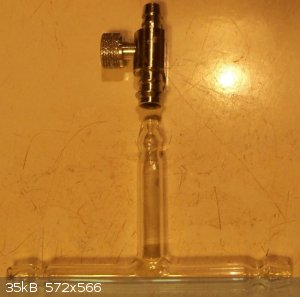
Elrik - 17-10-2018 at 14:11
I'm gathering materials to upgrade to vacuum distillation. One thing I've observed on some peoples setup is some provision to break the vacuum more
gently than just yanking the hose off the vacuum adapter. I assume this is to prevent the product from spraying back up the condenser or the whole
unit just blowing apart with the sudden inrush of air.
I found this, for lack of a technical term, 'breakable air diode' on an old sphigmomonometer. At rest air can only flow one way, then when the button
is pressed air can flow both ways through a hole 1.5 mm in diameter. My idea is to put this on a T in line with the vacuum so I can press the button
to let air in, then pull the diode off, and then turn off the pump.
Assuming the diode can tolerate the vacuum I'll be putting on it I am unsure on two points:
I'll only be going down to 10 torr at best via ice water aspirator, is a provision for more gentle break of the vacuum needed at 10 torr or are those
measures only for when very high vacuums are achieved?
Also, keeping in mind I'd press the release with the vacuum still running, would a 1.5 mm opening possibly be too large? I have a lathe so I could
easily make a 1 mm constriction adapter to put on the end.
Thanks 

Deathunter88 - 17-10-2018 at 18:34
Usually for vacuum distillation you will have an inlet tube extending down into the reaction mixture to bleed in air and agitate the mixture to
prevent bumping. In that case you wouldn't need to break the vacuum, as you can simply turn off the pump and wait for the pressure to equalize on its
own.
Swinfi2 - 18-10-2018 at 14:12
When I break vacuums instead of yanking off the hose I squeeze/bend it until I hear the air hissing in, wait for the hiss to stop then take the hose
off. Never really seen this as a issue.
SWIM - 18-10-2018 at 19:40
Do you have a vacuum trap?
Just rig a release valve (even a rubber tube with a clamp) that breaks the vacuum at the trap.
Like if your trap is a filter flask use a 2 hole stopper to get the spare hole for the release valve.
The vacuum space in the trap will dampen out the pressure rise rate in your apparatus and may well be sufficient in itself to solve the problem.
I put a needle valve there so I can control the vacuum with it as an air bleed, but it could also make a great controlled way to release vacuum if
you're not in a hurry.
The valve I use is an old brass one from a fish tank bubbler, but I've seen diagrams where a needle-valved Bunsen burner base is used.
Elrik - 19-10-2018 at 11:04
Now thats a good point, I hadnt considered that I would often have a trap in line. I have a 1.5 litre filter flask for that. So I'll just plan on
doing it that way, perhaps using this diode on the 2 hole stopper, then I'll just do it Swinfi2's way if I run the vacuum without a trap for whatever
reason.

BromicAcid - 19-10-2018 at 13:25
I usually have a adapter with stopcock on the pot connected to a nitrogen source that I use for inital purging of the setup and also at the end for
releasing to atmospheric pressure. I just shut off the pump and open the valve and back-fill with nitrogen.
RogueRose - 19-10-2018 at 18:50
You could use a T connector and put a needle valve coming off of it, then just turn the needle valve slightly to allow the air to slowly come back in.


